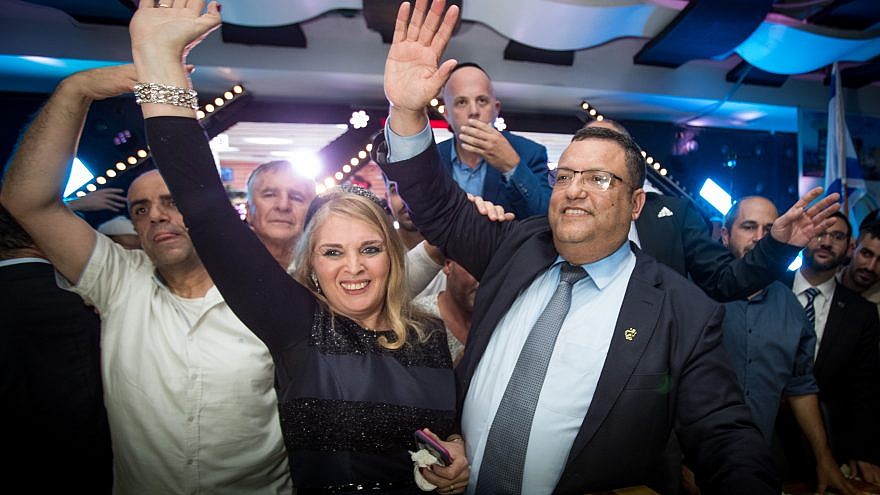In Jerusalem, a new Lion is expected to roar
Like the notable (and sometimes notorious) mayors before him, 57-year-old Moshe Lion will start the complicated business of putting policies and promises into action.
By Maayan Jaffe-Hoffman
(November 16, 2018 / JNS) Moshe Lion will open the door to his new office on Monday in City Hall in Safra Square in downtown Jerusalem. With the Old City walls in sight, he will begin to put into place the policies he envisioned and the promises he made in the course of a lively election that came down to the wire.
In other words, like the notable (and sometimes notorious) mayors before him, he will start to make his specific mark on the City of Gold.
Lion, 57, defeated his much younger competitor, 35-year-old Ofer Berkovitch (Hitorerut) by a margin of 50.85 percent to 49.15 percent (fewer than 4,000 votes) to become the next mayor of Jerusalem in the second-round runoffs on Nov. 13.
The mayor-elect had the support of the Likud Party and several top politicians, including Regional Cooperation Minister Tzachi Hanegbi, Transportation and Intelligence Minister Yisrael Katz, Sports and Culture Minister Miri Regev and Public Security Minister Gilad Erdan. Former Jerusalem Mayor Nir Barkat also endorsed Lion.
Ashley Perry, a former Jerusalemite who now lives in Efrat, said he worked with Lion in the past and can “attest to the fact that he is an excellent manager, having served as director-general of the Prime Minister’s Office, which will serve him well when managing the capital city.”
Perry called Lion sensitive and empathetic.
“He is able to reach many different communities and people from a wide variety of backgrounds,” said Perry. “I think he is underestimated because of a tough campaign, but I am sure that when he gets to work, he will win over more and more admirers and supporters.”
Jerusalemite Gabriel Mitchell tweeted on Nov. 13, “Iron like a Lion in Zion: congratulations to @MosheLion, #Jerusalem’s new mayor.”
According to Peggy Cidor, who has been covering Jerusalem and its mayors for more than two decades, Jerusalem had around 600,000 eligible voters. Of those, 110,000 are Arabs, who this year—as in all years since 1967—boycotted the election.
“If you remove Arab voters, then the city had around 40 percent participation,” said Cidor. “Forty percent of the Jewish population is not bad, but it is not enough.”
The lowest voter participation was from low- to middle-income traditional and Mizrachi voters, sectors that may have been likely to vote for Lion, who is Sephardic and similarly religious.
But Cidor said that the battle for Jerusalem was not between the pluralists and the haredim, as many people assumed. Rather, the election centered on “a war” between haredi populations: Lithuanian Jews (or Litvaks) and Chassidim.
The Lithuanians supported Lion. The Chassidim supported neither candidate and committed to boycotting the election. Then, around 2 p.m.—one hour after polls opened on Tuesday—Berkovitch “quietly and discreetly” worked out a deal with the Chassidim, said Cidor, who then were encouraged to go vote.
“The message was sent like this: ‘It is important to participate in elections. Don’t vote for Lion,’ ” said Cidor. “They did not say for whom to vote, but there were only two candidates. It was too late, and it was not enough.”
She continued, “If Berkovitch would have been elected, he would have been elected thanks to the votes of haredim—the Chassidim,” Cidor said. “Lion was voted into office thanks to the other haredim—the Litvaks. The election was decided by the haredi sector, which is more divided than it has been since the days of the Baal Shem Tov” (Israel ben Eliezer, 1698-1760).
‘For the good of Jerusalem’
Another interesting aspect of the Jerusalem election, according to Professor Gideon Rahat, director of the political reform program at the Israel Democracy Institute, was how the candidates rallied their voters. Berkovitch, he said, largely collected his votes one by one. In contrast, Lion got voters in blocs.
“In a democracy, the decision to vote for someone is supposed to be based on individual choice,” said Rahat. “When people all vote for the same person because their rabbi told them to, it is not exactly what is meant by free choice.”
“It is not a sad day for democracy in Jerusalem
